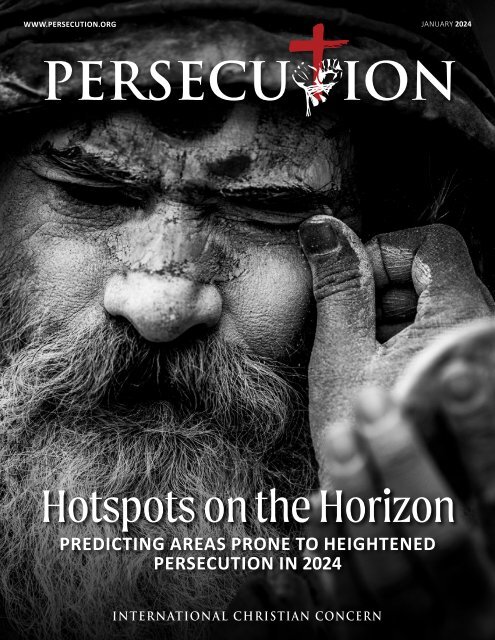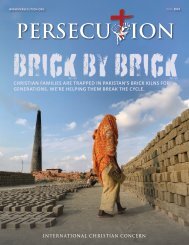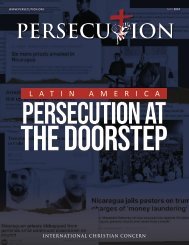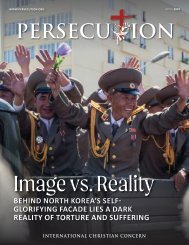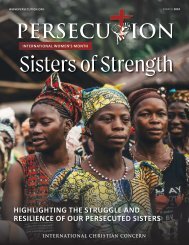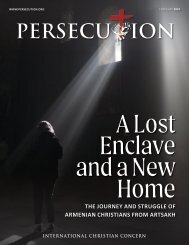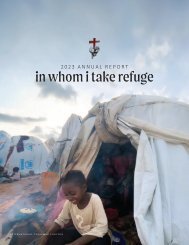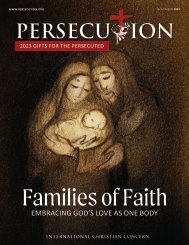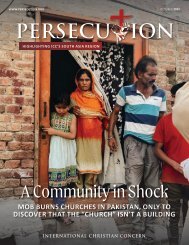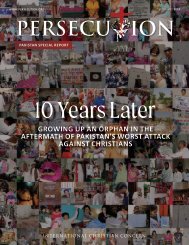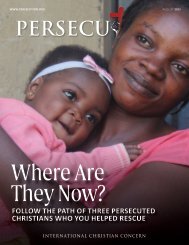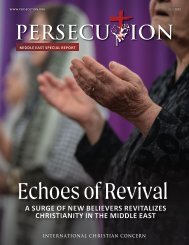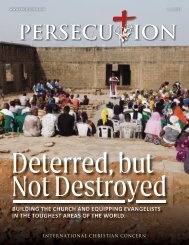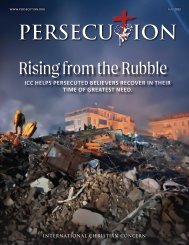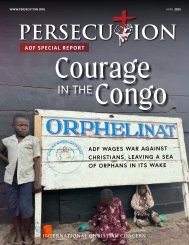January 2024 Persecution Magazine
Create successful ePaper yourself
Turn your PDF publications into a flip-book with our unique Google optimized e-Paper software.
WWW.PERSECUTION.ORG<br />
JANUARY <strong>2024</strong><br />
PERSECU ION<br />
PERSECU ION<br />
PERSECU ION<br />
PERSECU ION.ORG<br />
INTERNATIONAL CHRISTIAN CONCERN<br />
Hotspots on the Horizon<br />
PERSECU ION.ORG<br />
PREDICTING AREAS PRONE TO HEIGHTENED<br />
INTERNATIONAL CHRISTIAN CONCERN<br />
PERSECUTION IN <strong>2024</strong><br />
PERSECU ION.ORG<br />
INTERNATIONAL CHRISTIAN CONCERN
Contents<br />
JANUARY <strong>2024</strong><br />
ON THE COVER<br />
A Hindu Sadhu sitting in the temple,<br />
Kathmandu, Nepal. Radical Hindu ideology is<br />
making its way across the border from India<br />
into Nepal, spelling bad news for Nepalese<br />
Christians.<br />
Photo: hadynyah/iStock<br />
FEATURES<br />
10<br />
ECHOES OF<br />
INTOLERANCE<br />
14<br />
TEARS ON SACRED<br />
GROUND<br />
16 18<br />
BALANCING ACT<br />
THE PARADOX OF<br />
YOUTH<br />
Tracing the influx of<br />
radical Hinduism in a<br />
once-tolerant society.<br />
The heartbreaking plight<br />
of Eritrea’s persecuted<br />
Christians.<br />
Christians navigate a fragile<br />
state of peace among<br />
neighbors in Mindanao.<br />
Promise and peril in<br />
Africa’s future.<br />
RECURRING<br />
04<br />
06<br />
08<br />
22<br />
ICC NEWSROOM Your Source for <strong>Persecution</strong> News<br />
WEST WATCH Issues Involving Christianity in the West<br />
YOUR HANDS AND FEET ICC Projects Made Possible by Our Supporters<br />
CROWNS OF COURAGE Inspiration from Memorable Martyrs<br />
@persecuted @persecutionnews @internationalchristianconcern International Christian Concern<br />
OUR MISSION: Since 1996, ICC has served the global<br />
persecuted church through a three-pronged approach of<br />
advocacy, awareness, and assistance. ICC exists to bandage<br />
the wounds of persecuted Christians and to build the church<br />
in the toughest parts of the world.<br />
DONATIONS: International Christian Concern (ICC) is a nonprofit 501(c)(3) (all<br />
donations tax-deductible). ICC makes every effort to honor donor wishes in regards to<br />
their gifts. Occasionally, a situation will arise where a project is no longer viable. ICC<br />
will redirect those donated funds to one of our other funds that is most similar to the<br />
donor’s original wishes.<br />
2<br />
<strong>Persecution</strong> | JANUARY <strong>2024</strong><br />
© Copyright <strong>2024</strong> ICC, Washington, D.C., USA. All rights reserved.<br />
Permission to reproduce all or part of this publication is granted<br />
provided attribution is given to ICC as the source.<br />
2020 Pennsylvania Ave. NW #941 | Washington, DC 20006-5441<br />
STAFF<br />
Publisher Jeff King<br />
Managing Editor Alex Finch<br />
Editor and Designer Hannah Campbell
Hotspots on the Horizon<br />
As 2023 wrapped up, we launched ICC’s annual Persecutors of<br />
the Year report, naming and shaming many of the year’s worst<br />
violators of religious freedom. Among the “dis-honorees” were<br />
many countries that are notorious for abusing their citizens or turning<br />
a blind eye to persecution, including North Korea, Iran, and China,<br />
among many others.<br />
Now, with <strong>2024</strong> upon us, we are turning our eyes to the year ahead.<br />
What hot spots for persecution do we see on the horizon?<br />
Among the returning offenders is the tiny nation of Eritrea, commonly<br />
referred to as the “North Korea of Africa.” While the nation’s non-state<br />
sponsored Christian community operates in secrecy, those who are<br />
found practicing their faith are subject to arrest, torture, and sometimes<br />
execution at the hands of their own government.<br />
Moving north to Nepal, we see a concerning trend unfolding. Fueled<br />
by the spread of radical Hindu ideology from neighboring India, the<br />
foundation of religious freedom and historical tolerance seems to be<br />
crumbling.<br />
Further east, religious and political tensions are colliding in Mindanao,<br />
the southernmost island of the Philippines, leading to great instability<br />
and persecution. While the island remains predominantly Christian, a<br />
large Muslim majority is pushing for the adoption of Sharia law.<br />
Take a trip through the pages ahead to learn more about this year’s hot<br />
spots and how ICC is serving in these regions.<br />
It’s our hope that you will join us throughout the month to pray for our<br />
brothers and sisters in these nations.<br />
Thank you for your continued concern and God bless.<br />
God bless you!<br />
JEFF<br />
Jeff King, President<br />
International Christian Concern<br />
Author: The Last Words of the Martyrs and<br />
Islam Uncensored<br />
PERSECUTION.ORG 3
ICC Newsroom<br />
YOUR SOURCE FOR PERSECUTION NEWS<br />
Christian Church<br />
Bombed in Sudan<br />
A church was bombed in Omdurman,<br />
Sudan, leaving multiple communities<br />
devastated. The Church of Savior, which<br />
stood for 81 years, has been shared<br />
amongst two communities. In an attack<br />
believed to be related to the ongoing<br />
violence in Sudan, the bombing left the<br />
roof in ruins and the inside completely<br />
burned, including all the Bibles and<br />
hymnals.<br />
This incident is one of many church<br />
bombings in 2023. Since former President<br />
Bashir was removed from power in 2019,<br />
Sudan has been in a stat of flux, increasing<br />
in April 2022 when the two leading forces<br />
split clashed.<br />
Christian Killed in His<br />
Home by Muslim Extremist<br />
Farhan ul-Qamar, a 20-year-old<br />
Christian man in Pakistan, was shot<br />
and killed in his home by a Muslim<br />
extremist claiming hatred toward both<br />
Christians and Jews.<br />
The killer, identified by police as<br />
Muhammad Zubair, broke into the<br />
home on the night of Nov. 9 and fatally<br />
shot ul-Qamar three times. After the<br />
murder, he held the family hostage for<br />
nearly an hour, refusing to allow them<br />
to call for help. Doctors later told the<br />
media that he could have been saved if<br />
help had arrived sooner.<br />
Zubair’s violence seems to have<br />
worsened in recent weeks, escalating<br />
in response to the current conflict in<br />
Israel and Gaza. He has a reputation<br />
that, even after hearing three shots<br />
fired in the home, neighbors remained<br />
inside for fear of being his next victims.<br />
Other Christians in the village have fled<br />
their homes with the same fear, in an<br />
attempt to remove themselves from the<br />
community for their own protection.<br />
Zubair is currently in police custody after<br />
being arrested in his home shortly after<br />
the incident and his case is still waiting<br />
for resolution. The family of the victim<br />
is currently seeking financial assistance<br />
to secure legal representation. Without<br />
this, the murderer may be set free.<br />
War Escalates, Tatmadaw<br />
Loses More Control<br />
Fighting in Myanmar is escalating<br />
quickly, posing the biggest threat to the<br />
Tatmadaw’s control of Myanmar since<br />
they took power in a ruthless coup in<br />
2021. In early December, indigenous and<br />
pro-democracy forces launched numerous<br />
offenses against the Tatmadaw in specific<br />
states. One Myanmar political and military<br />
analyst claims that the Tatmadaw is<br />
actively collapsing across the country.<br />
4<br />
<strong>Persecution</strong> | JANUARY <strong>2024</strong>
VISIT OUR WEBSITE, PERSECUTION.ORG, FOR THE LATEST NEWS<br />
ONLINE FEATURE<br />
Beaten Down,<br />
But Not Forsaken<br />
As the Israel-Hamas war ensues,<br />
the Israeli Defense Forces (IDF)<br />
has surrounded Gaza City’s<br />
center to remove Hamas’ military<br />
and governance control over<br />
the territory. With casualties<br />
mounting (more than 11,000 at<br />
the time of writing) and fighting<br />
centering around Gaza’s main<br />
hospitals, many difficult questions<br />
surround the rising civilian<br />
casualties and how this tragic war<br />
will unfold in the coming weeks<br />
for Palestinian civilians living in<br />
the densely populated strip.<br />
<strong>Persecution</strong> Continues Against Algerian Christians<br />
The Algerian government continues its<br />
crackdown on churches in the North<br />
African nation of 42 million people. House<br />
churches can now only have a maximum of<br />
ten people per gathering.<br />
In 2022, Algeria closed at least 16<br />
churches, as a continuation of closures<br />
since COVID-19 lock downs in 2020.<br />
Government officials have limited house<br />
church gatherings to 10 people, and several<br />
Algerian church leaders were sentences to<br />
prison in early November 2023.<br />
Algerian Christians’ right to peaceably<br />
gather for religious meetings must<br />
be upheld, even in political turmoil.<br />
Christianity in Algeria has a long history,<br />
and a distinction must be made by the<br />
Algerian government between peaceful<br />
practice of Algerian Christians’ faith and<br />
political movements in the region.<br />
Four Killed in Philippines Church Bomb<br />
On Sunday, Dec. 3, a bomb killed four<br />
people and injured 54 others at a Catholic<br />
mass service in Marawi, Mindanao, the<br />
southernmost region of the Philippines.<br />
The bomb exploded during the mass held<br />
at a local university gymnasium. Islamic<br />
State terrorists quickly took responsibility<br />
for this terrible act, claiming retaliation<br />
for the 11 militants killed in a military<br />
operation on Friday in Maguindanao del<br />
Sur.<br />
Read more about ICC’s analysis on<br />
Mindanao on page 16.<br />
Amid all characteristics and<br />
coverage on the clash of<br />
worldviews and politics underlying<br />
the Israeli-Palestinian conflict,<br />
including this current escalation<br />
of the conflict, the Gazan Christian<br />
community, often found stuck in<br />
the crossfire of conflict, is often<br />
not known or acknowledged in<br />
media coverage. So, who are the<br />
Christians of Gaza, what is their<br />
suffering in the current conflict,<br />
and what does their future look<br />
like through this dark hour?<br />
To read the full feature article,<br />
visit our website at www.<br />
persecution.org/beaten-downbut-not-forsaken,<br />
or scan the QR<br />
code with your mobile device.<br />
PERSECUTION.ORG 5
West Watch<br />
ISSUES INVOLVING CHRISTIANITY IN THE WEST<br />
ICC Contributes to USCIRF<br />
Report on Anti-Conversion Laws<br />
The United States Commission on<br />
International Religious Freedom<br />
(USCIRF) has released a report on<br />
anti-conversion laws prepared by<br />
International Christian Concern (ICC).<br />
ICC researchers Jay Church, McKenna<br />
Wendt, and Colton Grellier, together with<br />
USCIRF, outlined global restrictions on<br />
changing one’s religion. The report found<br />
46 countries with anti-conversion laws,<br />
amounting to almost 25% of countries<br />
globally.<br />
Around the world, governments restrict<br />
the right to religious freedom by limiting<br />
their citizens’ ability to convert. ICC<br />
researchers named four categories of<br />
anti-conversion laws: apostasy laws,<br />
anti-proselytism laws, laws concerning<br />
interfaith marriage, and laws relating to<br />
identity documentation.<br />
Of most concern are apostasy laws, which<br />
explicitly prohibit the public renunciation<br />
of one’s religion or belief. These laws exist<br />
in seven countries, including Brunei and<br />
Yemen, where converting to Christianity<br />
could mean a death sentence.<br />
Laws against proselytization, or sharing<br />
one’s faith, try to limit the growth of<br />
minority religions like Christianity. These<br />
laws range from banning missionary<br />
activity to restricting individuals from<br />
encouraging others to leave their religion.<br />
Of all the laws found in the report,<br />
anti-proselytism laws had the highest<br />
number, with 33 countries prohibiting<br />
proselytization.<br />
Laws on interfaith marriage are used to<br />
regulate or restrict conversion. These laws<br />
prohibit members from different religions<br />
from marrying – or require one to convert<br />
to another religion to marry. In countries<br />
like Algeria and Malaysia, Muslim women<br />
are restricted from marrying a non-<br />
Muslim man.<br />
Finally, some governments use identity<br />
documentation to restrict individuals from<br />
changing their religion on state-issued<br />
papers or records. These laws can compel<br />
individuals to reveal their religion or assign<br />
them a religion without the individuals’<br />
consent. They also allow governments<br />
to deny individuals identification<br />
documentation based on religion.<br />
Through the USCIRF report, ICC<br />
researchers aimed to paint a more<br />
complete picture of the global legal anticonversion<br />
landscape. Hopefully, this<br />
report will not only shed light on the issue<br />
of legal barriers to conversion but also<br />
encourage governments worldwide to<br />
reconsider the limits they are placing on<br />
their citizens’ right to conversion.<br />
To read the full report, visit www.uscirf.<br />
gov/publications/anti-conversion-lawscompendium.<br />
Christian Parliamentarian Found Not Guilty in Finland<br />
In a win for religious freedom, the Helsinki<br />
Court of Appeals found Christian Member<br />
of Parliament Päivi Räsänen and Lutheran<br />
Bishop Juhana Pohjola not guilty. The two<br />
had been accused of inciting hate-speech<br />
after sharing their beliefs on biblical<br />
marriage.<br />
Räsänen, who expressed her beliefs on<br />
social media, was facing charges under<br />
a section in the Finnish criminal code<br />
titled “War Crimes and Crimes Against<br />
Humanity.” Pohjola faced charges for<br />
publishing a booklet on biblical marriage,<br />
which Räsänen wrote almost 20 years ago<br />
Despite Räsänen and Pohjola having been<br />
acquitted by a lower district court in<br />
March 2022, the prosecution continued<br />
with their agenda of censoring Christian<br />
beliefs – a battle that has proven costly for<br />
them as this most recent decision ordered<br />
the prosecution to pay tens of thousands<br />
in fees to cover the costs for Räsänen and<br />
Pohjola.<br />
The prosecution has a deadline of <strong>January</strong><br />
15 to appeal, should they decide to<br />
continue their fight.<br />
6<br />
<strong>Persecution</strong> | JANUARY <strong>2024</strong>
POCKET POLICY<br />
Photo: GoFundMe Fundraiser Page<br />
Preacher Shot on<br />
Arizona Street Corner<br />
A Christian church leader is in critical condition after being shot in<br />
the head while preaching on a street corner in Glendale, Arizona.<br />
Hans Schmidt, 26, was sharing the Bible through a megaphone on<br />
public property when the incident occurred. Schmidt, who also<br />
serves as the outreach director at Victory Chapel First Phoenix, had<br />
engaged in such street preaching on numerous occasions.<br />
Authorities are still trying to determine if the shots came from<br />
someone in a car or a passerby on the street – and the suspects are<br />
still at large. However, witnesses say that a group of individuals had<br />
driven by before the shooting occurred, yelling hateful comments at<br />
Hans and threatening him to “get off the street.”<br />
Victory Chapel First Phoenix, where Hans is employed, shared that<br />
“Hans was taken to the ER where they discovered he had been shot<br />
after conducting a CT scan. He began seizing and was intubated.<br />
There has been some movement; however, physicians are uncertain<br />
how much is voluntary and began draining fluid from his brain. He<br />
remains in critical condition. Please continue praying.”<br />
Hans is a husband and father to two young children. He previously<br />
served as a military combat veteran as well. ICC prays for a<br />
miraculous recovery of Hans and that the perpetrators be brought<br />
to justice swiftly.<br />
RENEWING THE CALL<br />
CPC Designation<br />
for Nigeria<br />
In <strong>January</strong> 2023, U.S. Representative Chris H.<br />
Smith (R-NJ) introduced House Resolution 82<br />
into congress, pushing for the re-designation<br />
of Nigeria as a Country of Particular Concern<br />
(CPC). This was after the U.S. Department of<br />
State left Nigeria off its CPC list in late 2022.<br />
Each year, the U.S. State Department is<br />
tasked with designating countries where<br />
the government engages or tolerates<br />
“particularly severe violations of religious<br />
freedom” as a CPC in accordance with the<br />
International Religious Freedom Act of 1998.<br />
These designations make a global statement<br />
and justify the United States government in<br />
acting against such countries.<br />
Nigeria has been recommended for CPC<br />
designation for 14 years by the United States<br />
Commission on International Religious<br />
Freedom (USCIRF) and recommended as a<br />
Special Watch List Country for seven years<br />
prior, as outlined in their annual reports.<br />
However, the state department has only<br />
ever designated Nigeria as a CPC in 2020. It<br />
is vital that members of congress sign the H.<br />
Res.82 and recognize the immense hardship<br />
faced by those in Nigeria for decades.<br />
The State Department’s designations for<br />
2023 were not announced before the<br />
printing of this month’s magazine.<br />
As of December 1, Hans still remains in critical condition. His<br />
perpetrators are still unknown.<br />
ICC UPDATE TO THOSE ON CAPITOL HILL<br />
If you’d like to stay informed about ICC’s advocacy work and<br />
policy recommendations, subscribe to our monthly newsletter,<br />
The Capitol Dispatch at www.persecution.org/icc-advocacy<br />
PERSECUTION.ORG 7
Your Hands and Feet<br />
ICC PROJECTS MADE POSSIBLE BY OUR SUPPORTERS<br />
MIDDLE EAST<br />
Reviving Dreams by Rebuilding<br />
Moller’s Restaurant<br />
RESTORE: LIVES & COMMUNITIES<br />
Moller’s heart swelled with gratitude as he gazed at the<br />
transformed state of his restaurant in Qaraqosh, Iraq.<br />
Once a shattered dream amid the ravages of war, it now<br />
stood vibrant and hopeful.<br />
“The restaurant will be awesome with the brand-new<br />
equipment that you provided me with. Thank you ICC!”<br />
Moller expressed. “I used to knead the dough by hand<br />
which took a long time and effort, but now I have a<br />
big dough mixer, which will help me in making more<br />
quantities.”<br />
Having been displaced in 2014 during the ISIS invasion,<br />
Moller’s return to Qaraqosh wasn’t without its challenges.<br />
He left school to support his family, worked in a restaurant,<br />
and finally, dared to open his own. But food prices soared<br />
in Iraq, and sustaining his business became an uphill battle.<br />
Yet Moller insisted on staying.<br />
ICC continues to support Christians who are returning<br />
to former ISIS-strongholds. For Moller, we helped him<br />
develop his restaurant with the necessary equipment so<br />
he and his family can be sustained for years to come.<br />
8<br />
<strong>Persecution</strong> | JANUARY <strong>2024</strong>
Persecuted,<br />
Not Forgotten<br />
Aisha was born into a Muslim family<br />
and married at 15. She faced hardship<br />
when her husband took on three<br />
other wives, stopped supporting their<br />
children, and began abusing alcohol in<br />
2020.<br />
Masika’s Journey of Perseverance<br />
as a Disabled Refugee<br />
AFRICA<br />
Masika, a 10-year-old Christian girl in Beni, Democratic Republic of the Congo<br />
(DRC), has faced tremendous challenges as a disabled refugee. Her family’s world<br />
shattered when Islamic extremist rebels from the Allied Democratic Forces (ADF)<br />
attacked their community, killing 22 villagers, in an attempt to continue their<br />
mission to wipe out Christianity from the country. Carried on her mother’s back<br />
while fleeing, she suffered convulsions and slipped into a coma, leaving her<br />
unable to walk.<br />
In the midst of seeking refuge in Beni, Masika’s mother cares for her family of<br />
five while her father labors tirelessly to put food on the table. ICC provided a<br />
wheelchair for Masika along with food and clothing for the entire family.<br />
“This is beyond our understanding,” said Masika’s mother. “We thank ICC for the<br />
goods they brought to our child. So we say God continue to bless ICC. And we say<br />
to ICC to continue to help other people because we are facing insecurity in the<br />
Eastern DRC. May God bless you abundantly.”<br />
A friend advised her to embrace<br />
Christianity for peace, and she<br />
converted in February 2023. Her<br />
husband reacted by giving her an<br />
ultimatum to denounce Christ or leave<br />
their home. She chose her newfound<br />
faith, was physically removed from<br />
the house in April. She found shelter<br />
with her Christian friend. However,<br />
her family and husband’s threats of<br />
violence leave her in a precarious<br />
situation.<br />
ICC helped Aisha set up a retail shop<br />
to sustain her and her young children<br />
so she could escape the dangerous<br />
threats coming from her family.<br />
“Thank you God and my Jesus for what<br />
You have done for me. Thank you, ICC,<br />
for this wonderful work and for not<br />
forgetting us who are persecuted,” she<br />
expressed. “I have no words to express<br />
my happiness, but all I can say is thank<br />
you so much, and may God bless you.”<br />
PERSECUTION.ORG 9
ECHOES OF<br />
INTOLERANCE<br />
10<br />
<strong>Persecution</strong> | OCTOBER 2023
HOTSPOT: NEPAL<br />
TRACING THE INFLUX OF<br />
RADICAL HINDUISM IN A<br />
ONCE-TOLERANT SOCIETY<br />
By ICC’s South Asia Regional Team<br />
Nepal, renowned for its cultural richness and historical<br />
tolerance, is grappling with an alarming surge in<br />
religious persecution. This surge, largely fueled by the<br />
infiltration of radical Hindu ideology from neighboring<br />
India, has sparked concerns about the eroding fabric of<br />
religious freedom and tolerance in the country.<br />
UNPACKING NEPAL’S RISING PERSECUTION<br />
Historically, Nepal has prided itself on a legacy of religious<br />
tolerance, despite constraints on proselytization and<br />
conversion, which remained in place until the constitutional<br />
monarchy transition in 1990. But recent incidents reflect a<br />
stark departure from this narrative.<br />
What’s caused the rise of persecution recently? Government<br />
anti-conversion laws, societal pressures from non-Christian<br />
majorities, and harassment by authorities against Christians<br />
and other religious minorities have collectively contributed<br />
to the escalating persecution in the nation.<br />
The primary catalysts behind this surge lie within Nepal’s<br />
legal framework, particularly in the ambiguous and<br />
restrictive legislation governing religious conversion and<br />
proselytization. Provisions within Article 26(3) of the<br />
Nepalese Constitution and Chapter 19 of the Muluki Ain<br />
grant authorities sweeping powers to target minority<br />
religious groups under the guise of preserving decency and<br />
morality.<br />
PERSECUTION.ORG 11
BUT WE ARE NOT OF THOSE<br />
WHO SHRINK BACK AND ARE<br />
DESTROYED,<br />
To add to that, reports from the U.S. Department of State have underscored the influx of<br />
radical Hindu nationalism from India, further worsening tensions. Civil society groups confirm<br />
financial support flowing in from India to local Hindu nationalist groups, strengthening<br />
nationalism for the religious majority and further dividing the country along religious lines.<br />
FACING ADVERSITY<br />
Nepal’s situation stands distinct from neighboring countries like Pakistan and India, where<br />
religious persecution against Christians and other minorities has long been a grave concern.<br />
All of Nepal’s religious minorities, particularly Muslims and Christians, find themselves<br />
targeted by a surge of physical attacks and community-level ostracism. Such assaults not only<br />
jeopardize their safety but also impede their livelihoods, as community boycotts devastate<br />
their businesses, compelling some to relocate.<br />
The government response, marred by frequent harassment and criminal charges against<br />
religious minorities, has failed to ensure the protection of the religious minorities’ rights.<br />
Despite some instances of acquittal, cases often linger for years, instilling fear and inhibiting<br />
the free expression of faith.<br />
HOPE IS NOT LOST<br />
Amid these challenges, however, local NGOs and human rights organizations have shown<br />
resilience, fostering interfaith cooperation and amplifying voices against the growing number<br />
of persecution incidents. An interfaith coalition’s historic gathering in Kathmandu brought<br />
together diverse religious leaders and government officials to address religious freedom<br />
concerns.<br />
While the international community’s attention on Nepal’s religious persecution remains<br />
limited, it’s pivotal to recognize the urgency of this issue.<br />
The rise in intolerance not only threatens the religious diversity that has long defined Nepal,<br />
but also erodes the foundational values of tolerance and coexistence.<br />
As the echoes of intolerance reverberate across Nepal, it is imperative for both local and<br />
global stakeholders to unite, advocate, and stand in solidarity against the forces undermining<br />
the nation’s once-cherished values of religious harmony.<br />
BUT TO THOSE WHO HAVE<br />
FAITH AND ARE SAVED.<br />
HEBREWS 10:39<br />
12<br />
<strong>Persecution</strong> | JANUARY <strong>2024</strong>
PERSECUTION.ORG 13
TEARS ON<br />
SACRED GROUND<br />
The heartbreaking plight of Eritrea’s persecuted Christians<br />
By ICC’s Africa Regional Team<br />
A<br />
man broke down and wept openly at a church in<br />
Ethiopia. The pastor of the church asked the man<br />
what caused his anguish. Distraught, the man<br />
revealed that he is an Eritrean Christian who had<br />
just fled Eritrea as a refugee. While attempting to cross the<br />
border between Ethiopia and Eritrea, he and his son were<br />
separated. After three weeks of searching refugee camps,<br />
he received the worst news any parent can get: his son was<br />
shot and killed by Eritrean border guards.<br />
“I came to Ethiopia to take my son away from persecution.<br />
Now I must continue on without him,” cried the grieving<br />
father.<br />
Unfortunately, this story is all too common for Christians<br />
living in Africa’s most repressive country. While no one<br />
knows the exact number of believers living in Eritrea,<br />
one thing is known for certain: they are among the most<br />
persecuted on the planet.<br />
AFRICA’S MOST REPRESSIVE REGIME<br />
Eritrea is a small but strategically located nation in the<br />
Horn of Africa. After 30 years of war with Ethiopia, Eritrea<br />
officially became an independent country in 1993. Since<br />
independence, the country has been ruled by President<br />
Isaias Afwerki, the former leader of the independence<br />
movement. After initially leading the country toward<br />
democracy, the Afwerki regime became increasingly<br />
repressive to stay in control. His regime only allowed people<br />
to worship within one of the official state religions which<br />
include four denominations of Christianity. Within these<br />
official state religions, the Afwerki regime exercises near<br />
complete control significantly curtailing any real religious<br />
freedom in Eritrea.<br />
In 2002, the Afwerki regime attempted to help its<br />
international image regarding religious freedom by allowing<br />
religious groups outside the official state religions to<br />
register with the government to worship legally. To register,<br />
religious communities must provide detailed financial<br />
and membership information, as well as background on<br />
14<br />
<strong>Persecution</strong> | JANUARY <strong>2024</strong>
HOTSPOT: ERITREA<br />
all their activities in Eritrea. The 2002 declaration began a<br />
series of raids where Eritrean officials arrested Christians<br />
on foundationless grounds. At the end of 2005, there was<br />
an estimated 1,750 Christians held in prisons and military<br />
camps. Currently, the estimate of prisoners without a trial<br />
or even a crime charged to their name is approximately<br />
500, with hundreds more imprisoned with charges such as<br />
blasphemy or apostasy.<br />
Since the 2002 registration requirement came into<br />
existence, no religious group has passed the registration<br />
process. For now, all religious activity outside of the highly<br />
regulated official state religions is still illegal. Christians<br />
caught conducting religious activities, even something as<br />
simple as a Bible study at home, can be arrested, subjected<br />
to torture, and possibly executed under charges of treason.<br />
“Eritrea remains one of the worst examples of statesponsored<br />
repression of freedom of religion or belief in<br />
the world...Eritrean authorities conducted waves of doorto-door<br />
searches and arrests of individuals because of their<br />
religious identity, and increased oppression of Pentecostal<br />
and Evangelical Christian communities,” said Thomas Reese,<br />
USCIRF Commissioner.<br />
PERSECUTION.ORG 15
groups began rebelling forcefully against<br />
American influence in the Philippines, Marcos’<br />
strict rule, and the growing numbers of<br />
Christians in Mindanao. As a result, groups like<br />
the Moro National Liberation Front (MNLF),<br />
the Muslim Independence Movement, and<br />
the New People’s Army (communist) emerged<br />
and began causing havoc, particularly against<br />
Christians since the 1960s.<br />
Today, Christianity is the predominant faith in<br />
Mindanao. However, many Muslims continue<br />
to call for Mindanao to adopt Sharia law.<br />
Many Muslim groups push for Mindanao to<br />
leave the Philippines nation-state and join<br />
with their Muslim neighbors, Indonesia or<br />
Malaysia. Muslim extremists continue to<br />
fight running battles with the government,<br />
terrorizing local communities and targeting<br />
Christian pastors and churches.<br />
In 2014, militant terror organizations in<br />
Mindanao, like the Abu Sayyaf Group and the<br />
Dawlah Islamiya-Maute Group, joined forces<br />
with the Islamic State (IS) from the Middle<br />
East, unleashing a new wave of terror in<br />
the region. This directly led to the terrorists<br />
seizing Marawi City in 2017 (displacing<br />
400,000 people), the establishment of the<br />
Bangsamoro Autonomous Region in Muslim<br />
Mindanao to be separate from the rest of<br />
Mindanao and the Philippines, and a steady<br />
program of violence against Christians.<br />
Balancing Acts<br />
Christians navigate a fragile state of peace<br />
among neighbors in Mindanao, Philippines<br />
By ICC’s Southeast Asia Regional Team<br />
Mindanao is a beautiful yet difficult land where complex religious and<br />
political issues collide to bring instability and persecution to many<br />
Christians.<br />
Mindanao is the southernmost island region of the Philippines. Home<br />
to more than 27 million people, Mindanao has a large Muslim population, with<br />
one-quarter of locals following Islam. Islam took root here in the 13th century.<br />
Christians began arriving in large numbers to Mindanao in the 1960s and 1970s<br />
under Ferdinand Marcos’ iron regime. This led to increased tensions with local<br />
indigenous groups and established Muslim factions forming and growing. These<br />
For Christians in Mindanao today, there<br />
remains a real sense of fear as the political<br />
and religious turmoil keeps Mindanao in an<br />
unsettled state. In December 2023, IS claimed<br />
responsibility of a bombing in a Catholic<br />
service held at Marawi State University which<br />
killed four people and injured more than 50<br />
others. This heinous bombing came after<br />
increased operations from local police and<br />
military against Muslim militant groups linked<br />
to IS.<br />
Christians continue to face violence and<br />
harassment, with many driven out of Muslimmajority<br />
areas like Bangsamoro. As of<br />
February 2023, more than 120,000 Filipinos<br />
remain displaced because of armed conflicts<br />
and crime in Mindanao.<br />
Additionally, Mindanao’s huge natural<br />
disaster-prone part (typhoons, earthquakes,<br />
16<br />
<strong>Persecution</strong> | JANUARY <strong>2024</strong>
HOTSPOT: MINDANAO<br />
eruptions) constantly adds another layer of severe hardship for locals. Families<br />
and communities in Mindanao live in a fragile peace; an environment of instability<br />
and insecurity, especially with the strong presence of Muslim extremist groups and<br />
ongoing political, religious, and ethnic conflicts.<br />
ICC is identifying ways to serve and support local Christians. In December 2023, we<br />
supported local church planters working in an extremely dangerous environment<br />
in northern Mindanao. We provided Bibles for new followers of Jesus facing death<br />
threats and other challenges from family and community members and a motorbike<br />
to help the church planters navigate their mission field.<br />
We will keep working with local Christians, develop new partnerships, and seek more<br />
opportunities to strengthen the local Mindanao church to persevere amidst this<br />
persecution.<br />
ICC is watching the state of Christians in Mindanao closely.<br />
Christians in the Southeast Asia region face massive obstacles with ongoing wars,<br />
the strong presence of Muslim radicals and Marxist governments, and gigantic<br />
humanitarian, political, and religious pressures. However, the situation in Mindanao<br />
has all the ingredients for heightened and harsh persecution and will, in our view, be<br />
a growing hot spot of persecution again in the near future.<br />
We provided Bibles for<br />
new followers of Jesus<br />
facing death threats<br />
and other challenges<br />
from family and<br />
community members<br />
and a motorbike to help<br />
the church planters<br />
navigate their mission<br />
field.<br />
PERSECUTION.ORG 17
The Paradox of Youth<br />
PROMISE AND PERIL IN AFRICA’S FUTURE<br />
By Greg Cochran, Ph.D., ICC Fellow<br />
A quick Google search of the phrase “Youth Movement” yields millions of links to an unimaginable number of<br />
causes trying to lay claim to the next generation: Youth for Scouting, Youth for Palestinians, Youth for Jews, Youth<br />
for Civil Rights, Youth for the Environment, and Youth for Africa. Reading through the links is more tedious than<br />
watching a boring movie with a joyless companion. It takes so long!<br />
Why do people hunger for a youth movement? Most likely, the hunger reflects a hope to see their own movements<br />
have a future. As Thomas Bergler writes in his book “The Juvenilization of American Christianity,” people are<br />
concerned about “what they need to do to appeal to ‘the young people’ and to remain viable….” Obviously,<br />
Bergler has church ministries in view, but the strategy for all movements is the same: appeal to youth. Youth<br />
appeal drives entire industries like entertainment, fashion, and sports, and potentially drives noble causes like<br />
education, Christian ministry, and political reform movements. Everyone who cares about a cause also cares<br />
about that cause continuing into the future. So, youth appeals.<br />
18<br />
<strong>Persecution</strong> | JANUARY <strong>2024</strong>
HOTSPOT: THE SAHEL<br />
PERSECUTION.ORG 19
EMERGING OPPORTUNITIES AND CHALLENGES<br />
The continent of Africa is currently pregnant with a massive youth<br />
movement. Given the demographic outlook of African nations,<br />
marketers will likely be targeting Africa more in the future.<br />
Currently, people living on the continent of Africa make up 17.89%<br />
of the world’s population. However, Africa keeps growing younger.<br />
By 2050, more than 40% of the children in the world will be born<br />
and living in Africa. Thus, Africa represents a disproportionate<br />
opportunity for youth movements—particularly in those African<br />
nations across the Sahel. Across Africa, 19 of the 20 “youngest”<br />
nations in the world reside. And 14 of the 20 youngest nations are<br />
located in the Sahel.<br />
The fact that Africa is about to experience a global youth<br />
movement is not in dispute. As noted in an earlier article, Africa<br />
is the youngest continent; by 2050, it will be the only “youthful”<br />
continent. Yet, what might be disputed is whether this impending<br />
youth movement is a good thing. Is this growing African youth<br />
movement good and desirable?<br />
Maybe. It depends. If marketers in the U.S. accurately assess<br />
the value of youth, then Africa is primed to succeed in the next<br />
century. But what if the marketers are a little misguided or shortsighted?<br />
What if the vitality of a movement isn’t determined by<br />
youth but by something more critical than age?<br />
THE YOUTH MOVEMENT’S CROSSROADS<br />
Like a timid kid in a classroom of bullies, these questions want<br />
to raise a hand to get the teacher’s attention. And like a good<br />
teacher, Silvana Taska has noticed the questions. Writing a brief on<br />
behalf of the Project on Middle East Political Science (POMEPS),<br />
Taska explains that Yemen had a unique opportunity for political<br />
reform fueled by dozens of youth movements. As a result of this<br />
mobilization of youth, Yemen’s revolution lasted longer than most<br />
of the movements at the same time across the Middle East. Taska<br />
points out the particular vulnerability of youth and, thus, youth<br />
movements. The youth movement in Yemen—like other youth<br />
movements—dissolved predictably in one of two directions.<br />
Taska says, “Lack of employment and increasing poverty further<br />
pushed youth activists to two opposite actions: demobilization or<br />
taking up arms.”<br />
Taska’s study is instructive for the coming youth movement across<br />
Africa’s Sahel.<br />
First, the existing political order doesn’t relinquish power easily.<br />
Youth movements historically have dissolved and demobilized<br />
into the existing political order. Political power brokers understand<br />
the value of youth and, thus, absorb them into their own agendas,<br />
repaying with a seat at the table or with the promise of having<br />
a voice in the movement. Will the African youth movement<br />
dissolve into the existing political order? What will that dissolution<br />
produce?<br />
The second direction in which youth movements dissolve is<br />
more troubling—as youth are absorbed into violent extremist<br />
movements. Given the recent trend of violence across the Sahel,<br />
the coming youth movement may arrive with ominous overtones.<br />
According to the Africa Center for Strategic Studies, militant<br />
Islamist group-linked fatalities have reached an all-time high<br />
earlier this year across the Sahel.<br />
For the political opportunist, the coming youth movement offers<br />
hope for the renewal and longevity of the movement. For the<br />
militant extremist, the coming youth movement represents<br />
the hope for new recruits. The current situation in Borno state,<br />
Nigeria, is instructive on this point. Babagana Zulum, governor<br />
of Borno state, recently made this startling remark: “We have to<br />
stop the younger ones from being recruited into Boko Haram and<br />
ISWAP; otherwise, in the near future, the entire Nigeria will be<br />
wiped off the map.” In this instance, youth is a danger, not an<br />
advantage.<br />
Because of the vulnerability of those displaced persons in Borno<br />
state, violent extremist groups prey upon young, hungry recruits.<br />
These recruits aren’t necessarily hungry for violence. They’re<br />
just hungry. Violence has produced extreme poverty for these<br />
displaced Nigerians. In at least four areas of Borno state, poverty<br />
has reached beyond the crisis stage to the IPC Phase 4 emergency<br />
level. Youthful energy and the threat of starvation make for fruitful<br />
extremist recruiting.<br />
YOUTH, CONDITIONS, AND GOVERNANCE<br />
What Zulum’s statement signifies for the future is that youth alone<br />
is not enough to sustain a good movement. If any good movement<br />
goes forward, it does so by youth and by the conditions necessary<br />
for youth to thrive. What conditions allow youth to thrive?<br />
Strong families, faith in the God who created and sustains all<br />
things, access to private property, entrepreneurial opportunities,<br />
education, jobs, and a predictable rule of law. Many of these<br />
conditions are currently in flux in Nigeria and Borno state.<br />
In Borno state, violence, poverty, corruption, and predation<br />
dominate. Governor Zulum is leading an ambitious effort to get<br />
control of the situation, but many are critical of his actions. He aims<br />
to close the refugee camps in the area and move the internally<br />
displaced residents back to their original villages. His efforts are<br />
highly controversial. He maintains that the refugee centers create<br />
dependency and predation—dependency on NGO’s supplying<br />
food and other necessities. By predation, he means the predatory<br />
recruiting by ISWAP and Boko Haram in the areas where refugees<br />
are most vulnerable. Maybe Zulum’s strategy is too ambitious or<br />
is moving too fast. His point is still one that should be heard. A<br />
youth movement with the wrong conditions could actually hasten<br />
the demise of Nigeria and other African nations.<br />
Christians—particularly Christians in Nigeria—should continue to<br />
have strong marriages, strong families, and strong churches in the<br />
spirit of Christ’s command to “let the little children come and do<br />
not forbid them; for such is the kingdom of heaven” (Matthew<br />
19:14). Both the Old Testament and the New Testament affirm the<br />
value of a Christian household, including children (Deuteronomy<br />
6, Psalm 127, Ephesians 6). Christians have an opportunity and an<br />
obligation to invest in families, children, and youth discipleship<br />
strategies, which include youth leader development. While it<br />
may seem that other political matters are more urgent, the<br />
real existential crisis in Nigeria and across the Sahel might be<br />
determining how to welcome a healthy youth movement. May<br />
the Lord grant this movement to be an awakening rather than a<br />
darkening, a revival rather than a repeat of the violence to the<br />
poverty cycle.<br />
20<br />
<strong>Persecution</strong> | JANUARY <strong>2024</strong>
PERSECUTION.ORG 21
Crowns of Courage<br />
HIGHLIGHTING THOSE WHO HAVE SACRIFICED EVERYTHING FOR CHRIST<br />
A Martyr Who Taught<br />
Forgiveness to His People<br />
Father John epitomized the living essence of<br />
the Gospel teachings, exemplifying the divine<br />
commandments of loving one’s adversaries<br />
and bestowing blessings upon them. His<br />
humanitarian stances and good relations with people<br />
of all religions and sects distinguished him and made<br />
him trustworthy and reliable for everyone in his<br />
community.<br />
Born to Christian parents in a poverty-stricken village<br />
in Damascus, Father John’s life was entrenched in<br />
faith and service. As a devoted husband and a revered<br />
priest in a local church, he became a pillar of hope,<br />
especially during the turbulent times of conflict that<br />
ravaged Syria. Most Christians sought him to mediate<br />
for them to get back their kidnapped children from<br />
ISIS militants.<br />
The group of extremists kidnapped a promising<br />
young Christian doctor from Father John’s village.<br />
The perpetrators demanded an exorbitant ransom<br />
of $700,000 – an insurmountable sum for the<br />
impoverished family. The family turned to Father John<br />
in the hopes of having their son returned.<br />
Driven by an unyielding love and a profound sense<br />
of duty for his community, Father John fearlessly<br />
embarked on a perilous negotiation with the<br />
kidnappers. Through arduous efforts, he managed<br />
to reduce the ransom to $350,000, a slightly less<br />
daunting sum but still an impossible burden for the<br />
impoverished villagers.<br />
The doctor’s family sold their lands and homes, hoping<br />
to get their son back. Carrying the money, Father John<br />
went to meet the kidnappers in the hope that he<br />
would return with their son. He overlooked the blind<br />
hatred for Christians – let alone Christian priests – that<br />
characterizes these extremist groups.<br />
However, the kidnappers callously seized Father John,<br />
escalating their demands for an increased ransom.<br />
Cut off from his community, Father John endured<br />
unspeakable torture and indignities at the hands of his<br />
captors.<br />
“Did they offer him food or drink, or even vinegar<br />
mixed with myrrh?! How many blows and lashes did<br />
he taste?! Was he subjected to spit and insults like his<br />
Master?!” Said one community member.<br />
Tragically, what was anticipated as a triumphant<br />
homecoming turned into a nightmare.<br />
Instead of the priest and the doctor returning home,<br />
their lives were unjustly ended at the hands of their<br />
captors. The villagers’ hopes were shattered, their<br />
fears realized as the bodies of Father John and the<br />
doctor were callously discarded on the roadside,<br />
bearing the grotesque marks of torment and brutality.<br />
The villagers were devastated. This was not the<br />
first time that Father John was asked to mediate in<br />
kidnappings and thefts. He had succeeded many times<br />
in releasing kidnapped people because he was a cleric<br />
who was trusted and loved by everyone.<br />
This time, he did not complete his work but returned<br />
to his family slaughtered. And while all he wanted was<br />
to help set free the kidnapped people, this time, he<br />
was the victim.<br />
“May God have mercy on you, Father John,” they<br />
lamented, acknowledging his unwavering commitment<br />
to forgiveness even in the face of such heinous<br />
brutality. “Just as you taught us to forgive, may we too<br />
extend forgiveness to those who brought such sorrow<br />
upon you.”<br />
22<br />
<strong>Persecution</strong> | OCTOBER 2023
“Bear with each other and forgive<br />
one another if any of you has<br />
a grievance against someone.<br />
Forgive as the Lord forgave you.”<br />
- COLOSSIANS 3:13<br />
PERSECUTION.ORG 23
We’d love to hear from you!<br />
INTERNATIONAL CHRISTIAN CONCERN<br />
PO BOX 785460<br />
PHILADELPHIA, PA 19178-5460<br />
OR ONLINE AT<br />
WWW.PERSECUTION.ORG<br />
OR BY PHONE<br />
800-ICC-5441<br />
Giving via Will<br />
Provide now for a future gift to ICC by including<br />
a bequest provision in your will or revocable<br />
trust. If you would like more information on<br />
giving to ICC in this way, please give us a call at<br />
1-800-ICC-5441.<br />
PERSECU ION.ORG<br />
INTERNATIONAL CHRISTIAN CONCERN<br />
PERSECU ION.ORG<br />
INTERNATIONAL CHRISTIAN CONCERN<br />
PERSECU ION.ORG<br />
INTERNATIONAL CHRISTIAN CONCERN


